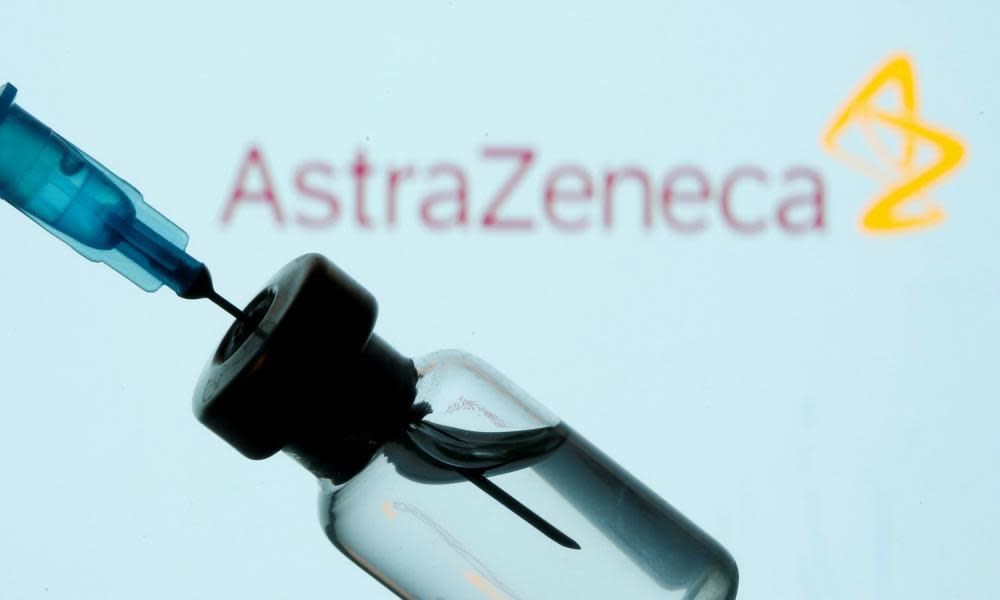Australia expects AstraZeneca vaccine to be rolled out in March despite EU export threat

The Australian government expects doses of the AstraZeneca vaccine to be rolled out in March and that there will be no shortfalls, despite threats by the European Union to block exports of the vaccine due to a lack of supply.
A spokesman for the health minister, Greg Hunt, said there was immense competition for Covid-19 vaccines around the world.
“We foresaw that early on,” the spokesman said. “We have the comfort and security of sovereign production here in Australia. That is why Australia has a contract with AstraZeneca and CSL for the onshore manufacture of approximately 50 million doses ... these doses are being manufactured in Melbourne.
Related: Pfizer Covid vaccine approved for Australia rollout but PM warns jabs not 'a silver bullet'
“This puts us in a strong position and it’s expected that doses will be available in March, as will international doses of the AstraZeneca vaccine.”
As well as the 50 million doses being produced on-shore, Australia will also import 3.8 million doses.
On Friday, AstraZeneca informed the European Commission that there would be significant shortfalls of up to 60% in the 100 million doses the European Union expected to receive in the first quarter of 2021.
Asked by Guardian Australia whether any action taken by the EU to block exports would affect Australia, a spokeswoman for AstraZeneca Australia said there had been “global supply challenges”.
“AstraZeneca’s plan remains to commence delivery of its vaccine to the Australian government as soon as possible, pending approval from TGA [Therapeutic Goods Administration].”
On Monday the TGA approved the Pfizer mRNA vaccine. The managing director of Pfizer Australia, Anne Harris, said: “We are still on track to deliver the first doses of our vaccine late February, and we are absolutely committed to delivering 10 million doses over 2021.”
While the federal government is responsible for securing and distributing the Covid-19 vaccines, the states and territories are responsible for ensuring qualified and trained staff deliver it, for identifying specific vaccination sites, and for ensuring immunisation providers are compliant with safety, ethical and reporting obligations.
No state or territory health department has detail yet on how many doses of the vaccine it will receive, or when. In a statement, Queensland Health told Guardian Australia it was “too early” to answer questions around how many vaccine doses the state would receive.
“The rollout of the Covid-19 vaccines represents the most significant coordinated immunisation campaign in global history,” the statement said.
“Queensland Health will work with Queenslanders and Queensland consumer groups to ensure individuals, particularly those belonging to key priority groups, are informed about how, when and why our state will be implementing its rollout.”
An ACT government spokesman said the Pfizer vaccine may only be administered at major public hospitals in metropolitan areas, due to its special storage and handling requirements.
“For the ACT this will be at Canberra Health Services initially, with the exact location being determined in collaboration with the commonwealth and Pfizer,” he said. “The Garran Surge Centre is a possible option under consideration.”
A spokesman for Victoria’s Department of Health and Human Services said the vaccines would be delivered through a range of locations and that “work is underway to identify sites across Victoria”.
“We’ll have more to say when locations are finalised,” he said. “Our priority is to make sure that any vaccine which becomes available can be administered to Victorians as quickly and safely as possible.”
Meanwhile, a NSW Health spokeswoman said the health department was prepared to start the vaccine program “as soon as the Covid-19 vaccine is received”.
“NSW Health planning is underpinned by a strong public health network and existing successful immunisation programs,” the spokeswoman said. “When the vaccine becomes available, NSW Health urges everyone who can be vaccinated to do so. Further information on the vaccine rollout will be provided as it becomes available.”
On Tuesday the Royal Australian and New Zealand College of Obstetricians and Gynaecologists updated its advice for pregnant women considering the vaccines, saying: “Although the available data do not indicate any safety concern or harm to pregnancy, there is insufficient evidence to recommend routine use of Covid-19 vaccines during pregnancy.
“However, if a pregnant woman meets the definition of being particularly vulnerable, then she should discuss the option of Covid-19 vaccination with her obstetrician and/or midwife.”
The advice is specific to Australia and New Zealand. Elsewhere, such as in the US and UK, the risk of pregnant woman becoming infected with Covid-19 is much higher, so decisions about whether to get vaccinated during pregnancy in those countries need to consider that risk.
Related: Australia halts New Zealand travel bubble over case of infectious new Covid variant
RANZCOG said that most pregnant women infected with Covid-19 would experience only mild or moderate cold/flu like symptoms.
“However, pregnant women are potentially at increased risk of complications from any respiratory disease due to the physiological changes that occur in pregnancy,” RANZCOG said.
“These include reduced lung function, increased oxygen consumption and changed immunity. In particular, pregnant women with co-morbidities are at higher risk of hospital admission, ventilation and severe illness.”
Based on known data from other similar vaccines, it is unlikely that Covid-19 vaccines pose a risk to a pregnant woman or her fetus, the advice states.
“However, as pregnant and breastfeeding women have not been included in initial trials, data are very limited and our current knowledge is based on inadvertently exposed patients and the impact of the disease in an unvaccinated population,” RANZCOG said.

 Yahoo Movies
Yahoo Movies 
